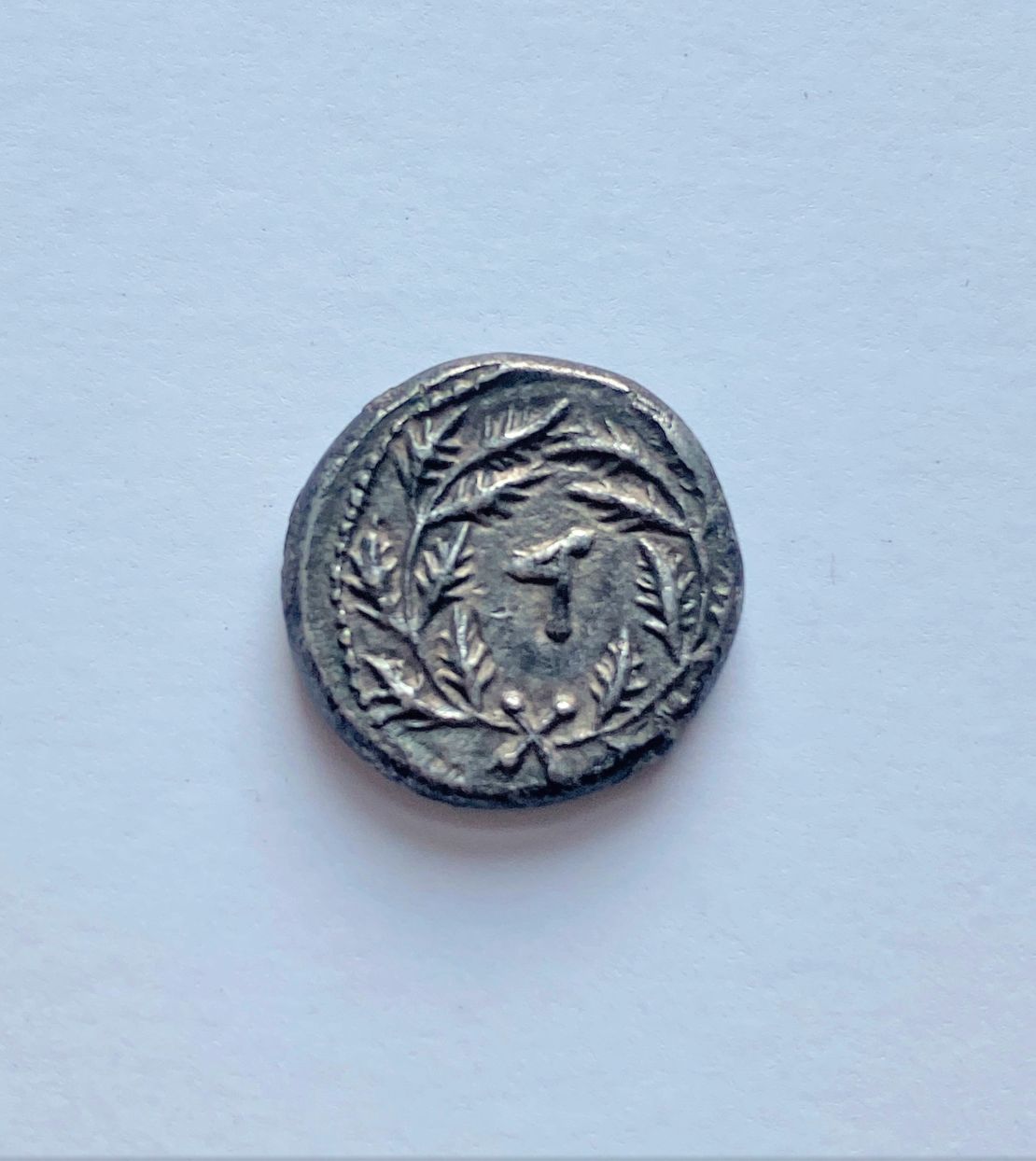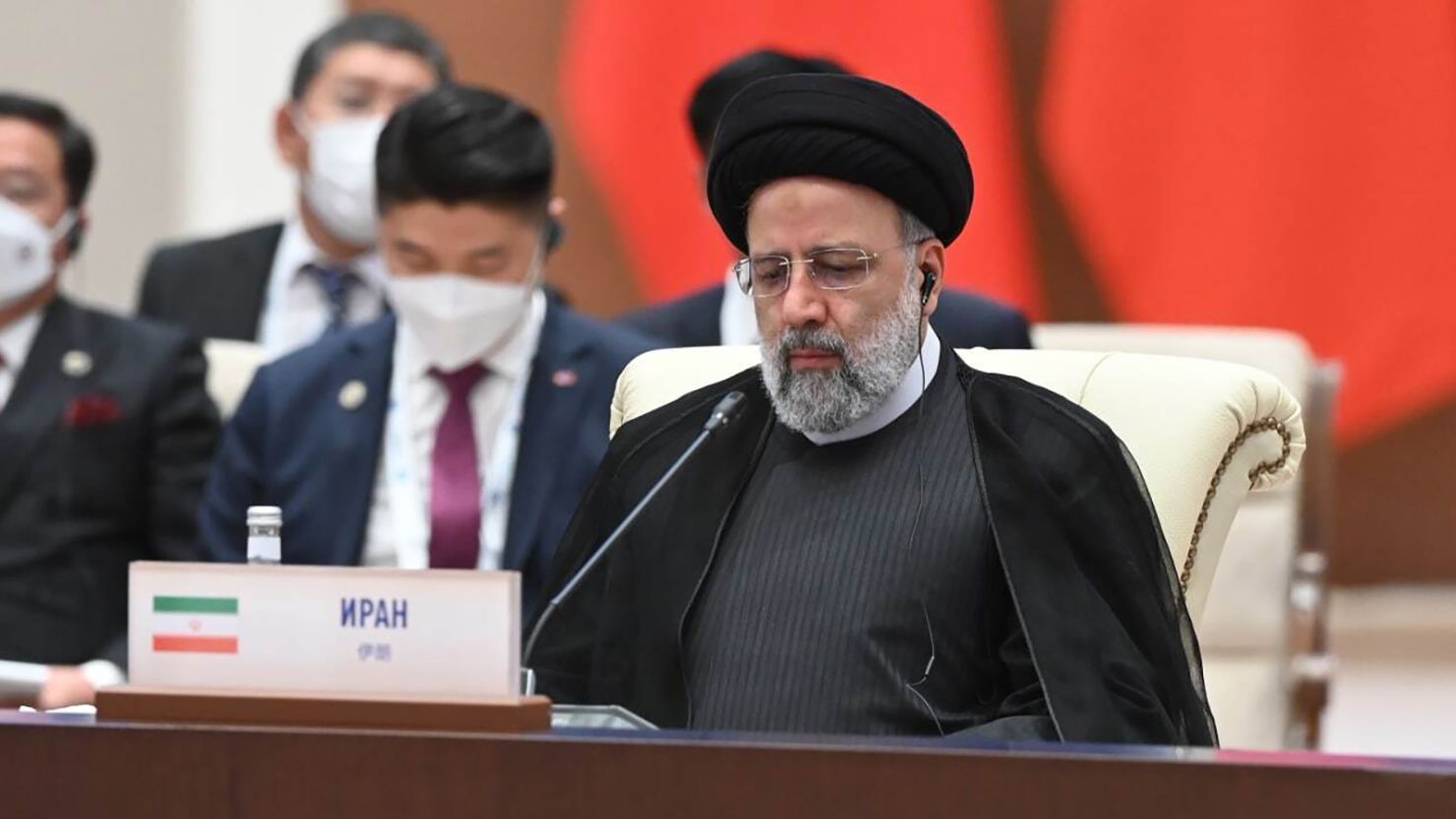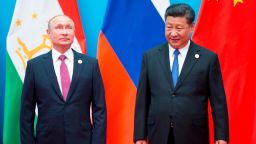Editor’s Note: A version of this story first appeared in CNN’s Meanwhile in the Middle East newsletter, a three-times-a-week look inside the region’s biggest stories. Sign up here.
Iran is set to formalize its relationship with the Global East, inching one step closer to joining the Sino-Russian axis as its nuclear talks with global powers falter.
The Islamic Republic on Wednesday signed a memorandum of obligations that will grant it full membership in the Shanghai Cooperation Organization (SCO), a climactic moment after a fifteen-year wait since it first applied to join the Asian body, which includes Russia and China.
Iranian President Ebrahim Raisi said on Friday that expanding the Asian organization could help defy Washington’s unilateralism, adding that thwarting “draconian” US sanctions required new solutions.
Hailed by Tehran as a successful entry into “a new stage of economic cooperation,” the soon-to-be accession comes as hopes to revive the 2015 nuclear agreement are diminishing, and Russia’s invasion of Ukraine has left the world in a state of polarization not seen since the Cold War.
Formed in 2001, the Asian bloc accounts for almost a third of the world’s economy. It includes ex-Soviet states Kazakhstan, Kyrgyzstan, Tajikistan and Uzbekistan, and more recently India and Pakistan. Iran had been an observer state since 2005.
While Iran’s bid for full membership was first approved last year, Wednesday’s decision comes at an awkward moment as both Iran and Western leaders had hoped that by now there would be an agreement on reviving the nuclear deal, says Trita Parsi, vice-president of the Quincy Institute in Washington, DC.
“Iran has managed to begin to break out of its isolation,” Parsi told CNN, noting that as the world turns multipolar, the West is now losing a key card it has long used to pressure Iran – namely the United States’ role as “a gatekeeper into the world economy.”
Western sanctions had been a major pressure point drawing Tehran to the negotiation table, some of which were meant to be lifted if the nuclear deal had been revived. Talks have, however, stalled once more and analysts say that both Iran and the West are preparing for a no-deal scenario.
While little material relief is likely to come out of the SCO membership, Iran is likely to use the optics of Wednesday’s signing to show the world that it is not alone, said Alex Vatanka, director of the Iran Program at the Middle East Institute.
“The symbolic aspect is undeniable,” he said, noting that in practice, however, it will mean very little in the short term for Iran.
On the sidelines of the summit, which took place on Thursday and Friday in the Uzbek city of Samarkand, Iranian President Ebrahim Raisi was pictured meeting with Russian President Vladimir Putin.
“In the short term, [Ebrahim] Raisi will get another smile from Vladimir Putin and some handshakes,” said Vatanka. “But it means nothing in economic terms.”
The alliance, therefore, seems mostly political, especially as Russia and China move away from the West and get closer to the Middle East.
“Iran interprets its membership in the framework of its regional security agenda of curtailing US regional influence and encroachments,” said Fardin Eftekhari, an expert on Iranian national security and foreign policymaking, noting that the SCO shouldn’t be compared to Western security blocs like NATO, primarily “due to its membership diversity and the lack of sustaining agenda.”
Tehran is therefore “testing a new pattern of multilateral security relationships within the SCO,” he added.
Some attribute Iran’s increasing alignment with Russia and China to the US’ failure to effectively leverage its influence while it still could.
The majority of UN Security Council states opposed using sanctions as a strategy to discipline Iran in 2020. Many states feared that it would only push Tehran into the arms of Russia and China, said Parsi.
But as former US President Donald Trump withdrew from the deal in 2018 and imposed a “maximum pressure” campaign on Iran, the Persian Gulf state started looking for new alliances.
In June, Iran also applied to join a group of emerging economies known as BRICS, which includes Brazil, Russia, India, China and South Africa. It has been selling its crude to China in an effort to cling to its last economic lifeline as Western countries refuse to buy its oil.
Iran has also been selling what US officials believe are weapons-capable drones to Russia at a time when Moscow is waging the largest European war since 1945.
Iran’s relations with Russia and China are not, however, without complication. Iran shares a bitter history with Russia and has over the last 150 years looked westward for economic partners, according to Parsi.
Not only are Russia and Iran competitors within the oil market, but they also have little in common apart from their shared anti-Americanism, said Vatanka.
Iran’s famous 1979 revolution slogan, “Neither East, Nor West,” points to the degree to which both the Iranian people and the ruling elite wanted to avoid a scenario where dependence on either Russia or the US was necessary.
Yet Western attempts to isolate Iran have pushed it in a direction that analysts say might prove detrimental for Tehran in the long run, even if there is slight short-term relief to its crippled economy.
“Had it not been for 30 or 40 years of sanctions on Iran, I think we would have seen a very different orientation of Iran,” said Parsi, adding that while it wouldn’t have necessarily been completely allied to the West, Iran’s foreign policy would have at least been a balanced one where there is less dependency on the East.
“Russia and China alone cannot compensate for what Iran could have had if it had a slightly more mainstream foreign policy,” said Vatanka.
The digest
UAE foreign minister in Tel Aviv for two-year Abraham Accords anniversary
The United Arab Emirates Foreign Minister Sheikh Abdullah bin Zayed al-Nahyan arrived in Israel’s Tel Aviv on Wednesday to mark two years since the signing of the Abraham Accords, the Emirati state news agency WAM said.
- Background: Sheikh Abdullah was set to meet Israel’s Prime Minister Yair Lapid at his residence in Jerusalem on Thursday, Israel’s government said. The visit will span several days to commemorate the normalization agreement, signed two years ago after the UAE formally ended its near-half-century boycott of Israel. This is the Emirati top diplomat’s second official visit to Israel. His first was to attend a meeting held in the southern Israeli city of Sde Boker in the Negev desert in March.
- Why it matters: The agreement opened doors to bilateral economic activity and security cooperation. Thousands of Israeli tourists now visit Dubai and other Emirati cities, while trade between both countries has steadily risen. The countries continue to cooperate on security and at a landmark meeting hosted by Israel in March, the UAE joined other Arab countries to demonstrate their newly formed close partnership.
Saudi crown prince to travel to London for condolences but won’t attend funeral
Saudi Crown Prince Mohammed bin Salman (MBS) will travel to London on Sunday to pay his respects to King Charles III and express his condolences on the death of Queen Elizabeth II, but the Saudi royal will not attend the funeral of the late monarch on Monday, a source close to the Saudi royal family told CNN.
- Background: The crown prince will return to Saudi Arabia right after he offers his condolences, the source added. Another senior member of the Saudi royal family may attend the funeral, according to the source.
- Why it matters: MBS had avoided traveling to Western states since the killing of Saudi journalist Jamal Khashoggi in October 2018 at the hands of Saudi agents. In July, he visited Greece and France, his first European Union trip since the murder. The crown prince last visited the UK in March 2018.
Five more banks in Lebanon held up by customers demanding access to savings
Customers held up at least five banks around Lebanon on Friday in an attempt to retrieve frozen savings just two days after the last such hostage situation, a Lebanese army official told CNN. In one incident, an armed man entered a bank and poured gasoline on the floor, threatening to burn the branch down if he wasn’t given access to his funds, state news agency NNA reported. He was able to retrieve around $19,000 and handed it to someone waiting outside the bank before handing himself to authorities.
- Background: Since October 2019, Lebanon has implemented severe restrictions on cash withdrawals as the country faces economic collapse. On Wednesday, two hostage situations at different banks took place in Beirut. In one incident, a woman managed to take a total of $20,000 from her account after taking hostages at a bank with a toy gun.
- Why it matters: Hostage takings are becoming more common in heavily armed Lebanon as citizens whose savings are frozen by banks say they are left with no option to retrieve their funds. In some cases, the hostage takers have said they have done so to help pay for their loved ones’ medical treatment.
What to watch
Under the reign of Queen Elizabeth II, Britian’s relationship with the Middle East significantly changed as colonial structures collapsed and strategic partnerships formed, some of which are sustained to this day.
Watch the full report with CNN’s Becky Anderson here:
Around the region

A coin dating back to a Jewish rebellion against Roman rule almost 2,000 years ago has been returned by the US to Israel following a joint smuggling investigation.
Minted in AD 69, the “exceedingly rare” quarter shekel is estimated to be worth over $1 million, according to the Manhattan District Attorney’s office, which hosted a repatriation ceremony in New York on Monday.
The move comes 20 years after Israeli authorities first learned, via informants, that the silver coin had been discovered by antiquities looters in the Ella Valley, south of Jerusalem. It is believed to be one of a cache of coins found by thieves in the area, which is home to numerous important archeological sites.
Investigators say the item entered the black market before being smuggled to the UK through Jordan. It was then exported to the US using false paperwork. In 2017, Homeland Security officers seized the coin in Denver, Colorado, where it was due to be offered at auction.
The kingdom of Judaea fell under Roman control in AD 6, though resistance to imperial rule led to a series of revolts known as the Jewish-Roman Wars. The coin dates to the fourth year of the First Jewish Revolt, also known as the Great Jewish Revolt, which began in AD 66.
By Oscar Holland
Photo of the day



